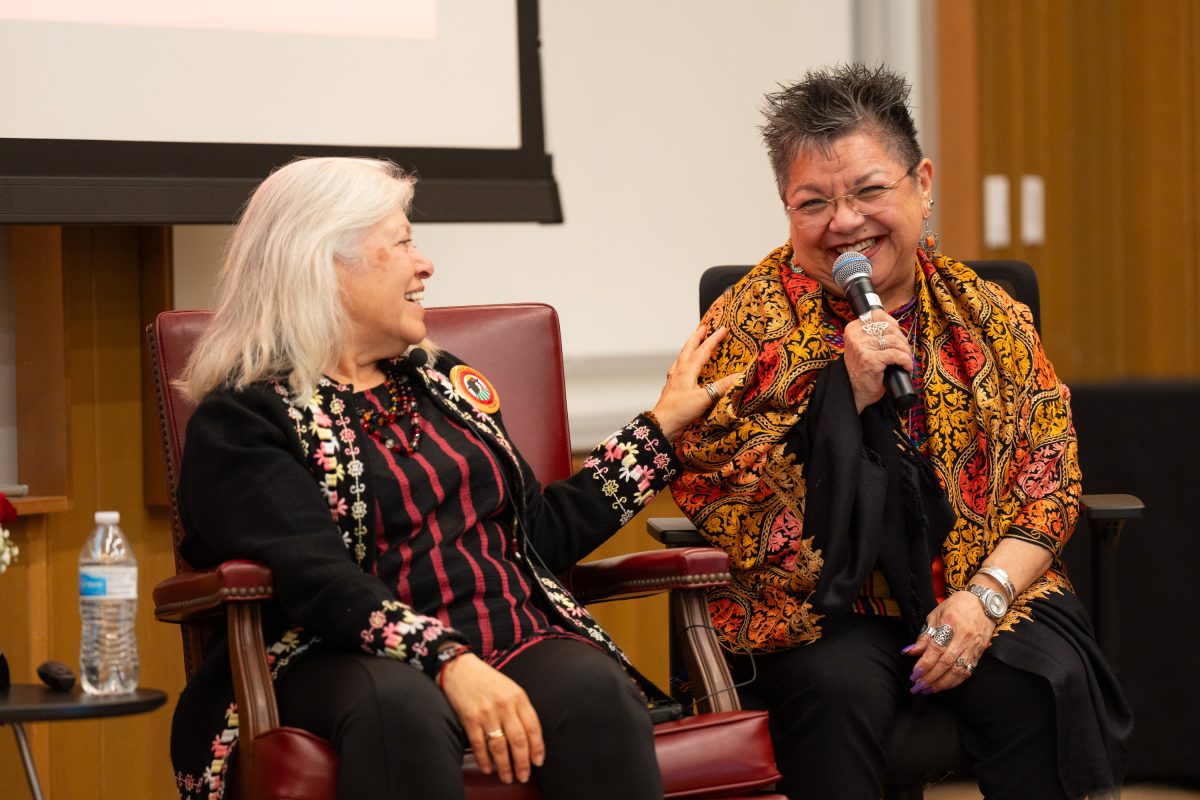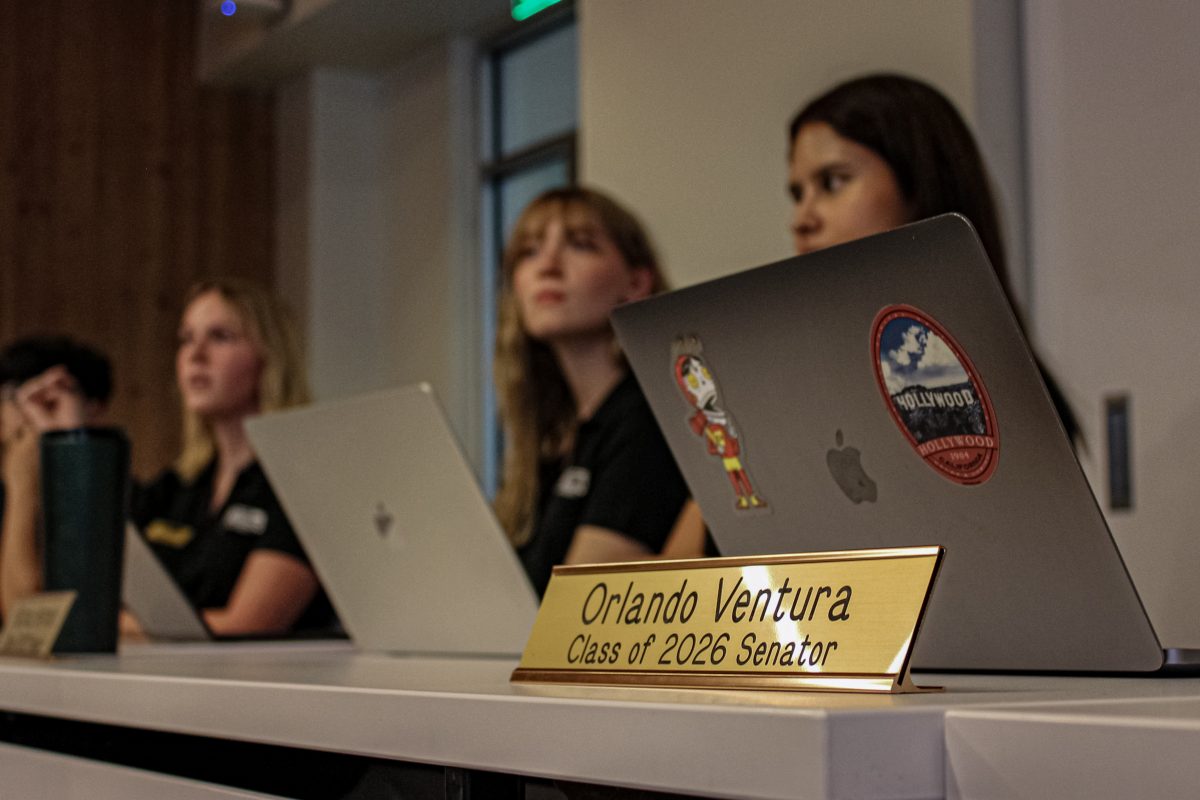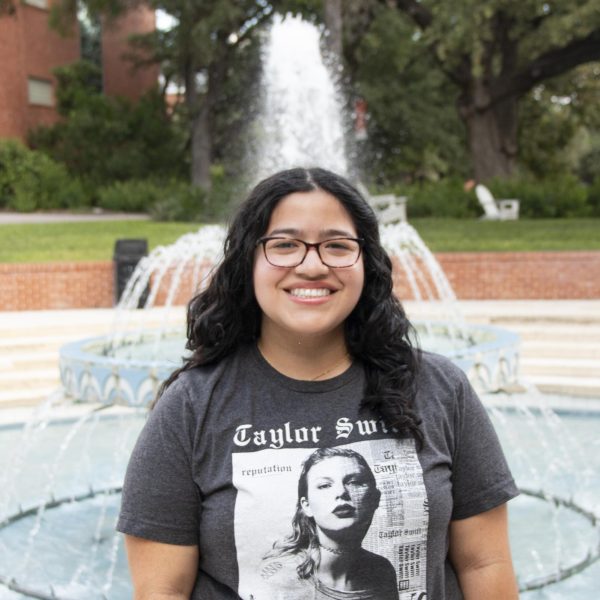On March 21, Trinity held “¡Pa’lante Siempre!”, a forum conversation moderated by Norma Elia Cantú professor of modern languages and literatures, about the legacy of César Chávez and Dolores Huerta, in Chapman Auditorium to prepare the community for the 38th Annual César Chávez March for Justice in the inner West Side of San Antonio on March 23.
The conversation highlighted two women with connections to migrant work, Mily Treviño-Sauceda and Erika Prosper Nirenberg. Treviño-Sauceda is the executive director and co-founder of Alianza Nacional de Campesinas (national alliance of female farmworkers or Alianza), the first national women farmworkers organization in the United States.
Nirenberg, the first lady of San Antonio, is the senior director of customer insights for HEB corporate and the co-founder of the Latina Leadership Institute, a program that provides Latina leaders with the skills, knowledge and confidence to assist them in political aspirations.
During the forum, Treviño-Sauceda touched on the difficulties farmworkers experience working in the fields. She explained how the Alianza works to give farmworkers access to pathways to citizenship, as well as protection against gender-based violence and inequitable working conditions.
“There was so much trauma that farmworkers lived. Just crossing the border, just living in fear, living in shacks, moving and migrating to different places. We lived that,” Treviño-Sauceda said.
Throughout the event, Treviño-Sauceda explained that she engaged with advocacy from her upbringing. Her family was involved in advocating for farmworker rights, and she has seen this trend continue in other families, especially with young girls.
“The minors, adolescents, they tag along with the mom, or the auntie or the grandma are learning, and they want their space,” Treviño-Sauceda said. “Get them [involved] as early as possible because that’s how they’re gonna continue that legacy.”
The conversation aimed to bring awareness to the legacies of César Chávez and Dolores Huerta in latino communities and aimed to reinforce that the push for farmworkers to have equal rights is an ongoing struggle. Cantú emphasized that conversations allow the community to listen and interact with individuals connected to social issues.
“Events on campus that remember the figures and their impact on society I think are critical for students so that it isn’t just a paragraph in a book,” Cantú said. “It isn’t something that happens in isolation, violence against women in this case, she was speaking about farmworkers, is everywhere.”
The march began eight minutes from Trinity, at the intersection of Guadalupe and Brazos street in the inner West Side of San Antonio. Walking to the tunes of local community groups, Trinity students and staff made their way to Hemisfair Civic Park on Saturday for the César Chávez March for Justice. This year’s theme was “Let the spirit flourish and grow,” a call to a line in the prayer of the farmworkers’ struggle written by Chávez.
Along the march path chants and songs such as “Viva (long live) César Chávez” or “No nos moverán” (we shall not be moved) were spoken and sung. University administration, such as president Vanessa Beasley and Andrew Wells, vice president for student affairs were in attendance. The Trinity group was accompanied by Upward Bound students and marching behind them was Grupo Tan Tan, playing Tejano music along the march route.
Katia Knickerbocker, sophomore environmental studies major and participant in the march, learned about the opportunity to attend the event from Trinity professor of anthropology and sociology David Spener in her oppression and liberation in the United States class. Knickerbocker observed various generations represented in the march participants.
“It’s really empowering to see all the young activists and seeing everybody that showed up to support a cause that they’re passionate about,” Knickerbocker said. “I think [the march] is a great way to kind of show up and meet other people who have better insight about what is kind of pushing the movement forward.”
The march and forum conversation were well-attended by community and staff members. Dania Abreu-Torres, director of the Mexico, the Americas and Spain (MAS) program, is looking for more student participation in the future..
“What I’m hoping is for next year, we can have more enthusiasm knowing that it [the events] will continue growing throughout the years.” Abreu-Torres said. ”
Individual experiences of a march can differ. Spener mentioned his experience of participating in the march this year was a way to be united with people and communities.
“It can be really joyous. It’s like you’re out there with people that are sharing your same values that are putting themselves out publicly and taking a stand together,” Spener said. “ Under the best of circumstances, there really is potentially joy in the struggle, and I think that’s something that’s important for people, especially our students, to learn about.”









